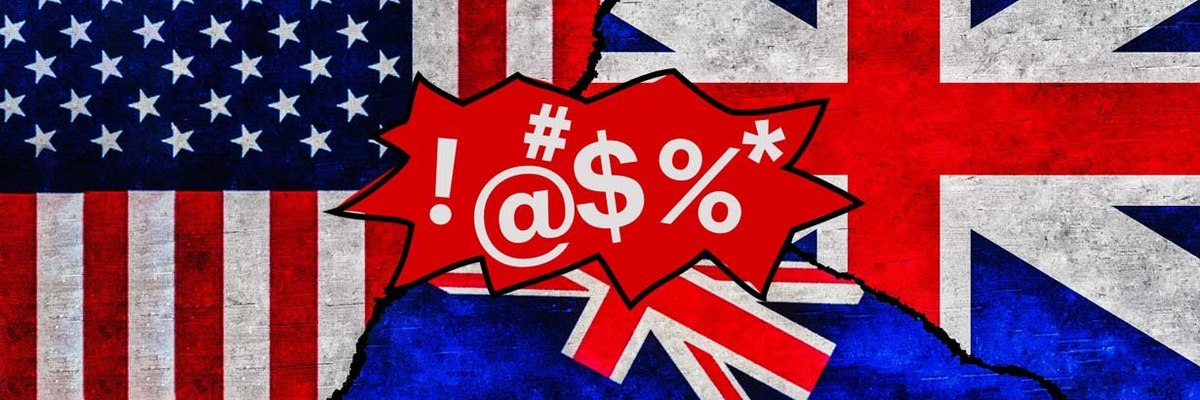Britons tend to be the more relaxed about swearing than those down under or across the pond
According to some stereotypes, when it comes to swearing, Americans have nothing on Britons and Australians. While Americans are claimed to find curse words such as ‘damn’ and ‘heck’ unconscionably strong, Aussies are supposedly happy to liberally sprinkle much harder words into every sentence.
But how true is this? A new YouGov study of America, Australia and Britain reveals how the three countries really think about swearing – who swears the most, where is it acceptable and what words are most offensive?
Americans are, indeed, more likely to hold an unfavourable view of swearing, with 43% saying they have an outright negative opinion of using foul language, compared to a third of Britons (33%) and Australians (34%).
The difference in attitudes between the three Anglosphere countries almost entirely comes from men. Results among American, Australian and British women are broadly the same, with around four in ten (37-42%) having a negative view.
Australian and British men, though, are less negative about swearing, with just three in ten (29-31%) having an unfavourable view of swearing, compared to 44% of American men.
How often do Americans, Australians and Britons swear?
A clear majority of Britons (57%) say they swear at least most days, compared to just under half of Australians (47%) and only four in ten Americans (39%).
Britain has the most regular swearers, with 37% of the British public saying they swear every day, compared to just a quarter of Australians (23%) or Americans (25%).
Where do Americans, Australians and Britons think it is acceptable to swear?
For most people, whether or not swearing is acceptable depends mainly on the context, such as where you are and who you are with.
At least seven in ten adults in America, Australia and Britain agree that it is acceptable to swear in your own home by yourself (75-88% say it’s acceptable), in response to physical pain (76-85%) or with friends when in private (71-82%). In all three cases, though, it is Americans who are the least likely to say it is acceptable.
At the other end of the scale, less than one in ten in all three countries think it’s okay to swear at a worker in a shop (3-9%), in a church (5-8%), if you’re at work with a customer or client (6-7%) or in front of children (5-6%).
The biggest dividing line is swearing at work with colleagues. Half of Britons (51%) believe this is at least somewhat acceptable, relative to 41% of Australians and just a third of Americans (32%). Americans are also least likely to think it’s okay to swear with your boss (11%) or someone who works for you (19%).
There are some instances where Australians are the most squeamish about swearing. The quarter of Australians (25%) who think it’s okay to swear in a social media post is less than the 32% of Americans and 38% of Britons who think likewise, while Australians are also less likely (37%) than Americans (44%) or Britons (51%) to think it’s okay to swear at a sporting event.
Which swear words are more offensive in America, Australia and Britain?
One of the stereotypes about Americans and swearing is they are offended by words like ‘heck’ that are almost comically weak to British and Australian ears, who are instead much more relaxed around the hardest swear words.
But on the two biggest hitters, there is actually little difference in attitude. Just over eight in ten (81-83%) in all three countries say ‘cunt’ is at least fairly offensive, with around seven in ten (70-72%) saying so of ‘motherfucker’.
But elsewhere, differences emerge. Just over half of Britons (53%) find ‘fuck’ offensive, compared to two thirds of Americans (65%) and Australians (66%), while a similar number of Americans (66%) place ‘bitch’ in the same category, relative to 55% of Aussies and Brits.
Generally, where the biggest differences exist, it is indeed Americans who find the word most offensive. Half of Americans (49%), for instance, find ‘douchebag’ very or fairly offensive, compared to 24% of Australians and 21% of Britons. Similarly, while 30% of Americans find ‘ass’ offensive, just 11-12% of Australians or Britons do.
Australians aren’t, however, always more aligned with the Brits. The 47% of Australians who see ‘cock’ as offensive, for instance, is equidistant between the 60% of Americans and 34% of Britons who say so. Meanwhile, the 57% of Aussies who find ‘pussy’ offensive is more similar to the 62% of Americans who say the word is fairly or very offensive than the 44% of Britons who do.
One word that Britons do find more offensive than others is ‘wanker’. For 53% of Britons, it is an at least fairly offensive word, a view shared with 41% of Australians and just 32% of Americans, one in seven of whom (15%) didn’t know how to categorise the word. Britons are also more likely than Australians to be offended by ‘bastard’ (45% vs 36%) and ‘bollocks’ (18% vs 10%).
Americans are much more likely than Britons to find offence in religious swear words such as hell (19% vs 4%), damn (13% vs 2%) and even heck (6% vs 1%).
How is ‘cunt’ seen in America, Australia and Britain?
The fact that similar proportions of Americans, Australians and Britons find the word ‘cunt’ to be offensive may be news to some, with it sometimes claimed that the word is seen as more acceptable in the UK than the US, carrying less misogynistic baggage.
Nonetheless, usage of the term does differ, with three times as many Britons (29%) saying they regularly use the word ‘cunt’ than Americans (10%), with Australian usage roughly in between (18%).
But while similar proportions of American men (11%) and women (9%) regularly drop the c-bomb, British men are twice as likely to use the ultimate swear word than British women (38% vs 19%), a trend also true in Australia (24% vs 12%).
Unlike Americans and Australians, Britons overall do tend to say that the word is not inherently misogynistic, by a margin of 45% to 35%. However, this hides something of a gender divide. Roughly half of women in all three countries (47-53%) say ‘cunt’ is inherently misogynistic, compared to 34% of men in both America and Australia and just 23% of British men.
Nonetheless, British women are twice as likely as American women (32% vs 16%) to say that the word is not inherently misogynistic, with 26% of Australian women feeling likewise. British men are most likely to take this view, with 59% saying the word is not misogynistic, compared to 46% of Australian men and 32% of American men.
What are the top swear words of Americans, Australians and Britons?
Some of the biggest differences in attitudes to swearing between the three countries come simply in which swear words are used.
‘Damn’ is one of America’s top swear words, with 55% of Americans saying they use it on a regular basis. But it has lesser usage in Australia, where it is used regularly by 44% of the public, and particularly Britain, where just 30% say they regularly use the exclamation, ranking behind dozens of other expletives.
One of these is ‘fuck’, which 67% of Britons say they regularly use, compared to 56% of Australians and less than half of Americans (47%). While ‘shit’ is similarly in the top three for all of our trio of nations, it is the only one of the swear words polled to be regularly used by a majority in all three, being regularly uttered by 65% of Britons, 61% of Australians and 54% of Americans.
Of the words polled in all three countries, ‘bollocks’ and ‘twat’ are some of the most exclusively British swears, with 39% of Britons regularly using them, compared to roughly one in ten Australians (8-11%) and even fewer Americans (2-6%).
It’s in the US you’re most likely to hear ‘jerk’, ‘motherfucker’ and ‘son of a bitch’, with around three in ten Americans (29-32%) regularly cursing with them, compared to 16-20% of Australians and 6-17% of Britons.
By contrast, ‘wanker’ and ‘bugger’ appear to have little currency in America. While roughly a third of both Britons (31-36%) and Australians (30-34%) regularly use either word, just 3% of Americans say they do.
The most uniformly used swear words across our three countries include ‘idiot’ (44-50% regularly use), ‘bitch’ (29-34%), ‘pussy’ (14%) and ‘effing’ (13-16%).
Full results:
Britain: General, Offensiveness, Usage, Acceptability
What do you think about American and Australian attitudes to swearing? What do you think about swearing in general, and everything else? Have your say, join the YouGov panel, and get paid to share your thoughts. Sign up here.
Photo: Getty







